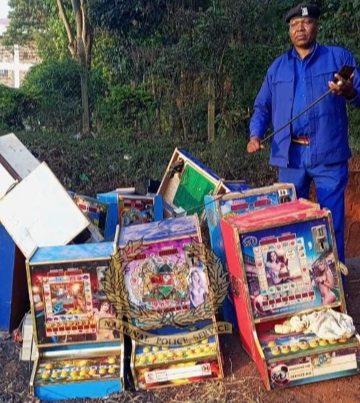
The Kenya Kwanza government has now trained its eyes on the Sh200 billion gambling industry.
Kenya is the third largest gambling market in Africa, after South Africa and Nigeria.
President William Ruto on February 17 set up a task force to come up with ways of properly regulating the gambling sector which includes gaming, lottery and betting.
“There has been an outcry regarding the state of betting, lottery and gambling in Kenya with many people saying there is no control or regulation,” said task force vice chair Gideon Thuranira.
He spoke during a public participation forum at Coast Girls Secondary school in Mombasa on Thursday.
He said the number of gambling addicts is alarming with children as young as 12 getting hooked to gambling, especially using the unregulated slot machines.
According to available data, the gambling market is expected to continue its rapid growth at a compounded annual growth rate of 7.5 per cent from 2020 to 2025.
This is driven by the popularity of online and mobile gambling.
Withholding tax on winnings from betting increased by 116.9 per cent from Sh465 million in December 2021 to Sh1 billion in December 2022, reflecting significant growth potential.
According to available data, Kenya has the highest percentage of young gamblers in Sub-Saharan Africa, at 76 per cent.
These outspend their peers on a per capita basis, with 96 per cent of them using mobile phones.
The typical Kenyan gambler is a male below 36 years of age, from a low-income household with at least a secondary school level education.
Thuranira said unscrupulous investors have taken advantage of the largely unregulated sector to engage in suspicious activities including financial fraud.
The task force cited lack of sufficient enforcement capacity based on the existing laws for the creation of room for wheeler-dealers to wreak havoc in the sector.
The sector is being regulated by a 1966 law, which does not capture emerging trends including online gaming and online payment.
This is the part of the reason some betting site operators have been taken to court for not paying winners their dues.
The government has come up with three documents to treat this malaise.
“We need to control these activities in a better way because we recognise that gambling is a recognised industry globally but if not well regulated and well controlled it come become a menace like it has threatened to be in Kenya,” Thuranira said.
The National Lottery Bill, 2023 which is undergoing public participation, aims to set up a National Lottery Fund controlled by the government and which is meant to turn the industry into a tool social for social progress.
Countries like Ghana, South Africa, Singapore, the US and UK have a National Lottery.
The fund will be under the Labour and Social Protection ministry and whose proceeds will be responsible for social projects like building hospitals, schools and other signature transformation projects that will be helping Kenyans.
The proposal is that the National Lottery proceeds will have 50 per cent of it go to paying prizes and taxes for prizes, 38 per cent will go to the National Lottery Fund, 10 per cent will go to the operators’ profits, tax, retailers, marketing and operational costs, one per cent will go to the National Gambling Regulatory Authority, 0.5 per cent to the National Lottery Board operations and 0.5 per cent to the National Lottery Fund operations.
The Gambling Regulatory Authority will be set up by the Gambling Control Bill, 2023, which is the second document that the government is coming up with.
The GRA will replace the Betting Control and Licensing Board, which currently regulates the gambling industry.
In the proposal, the 38 per cent of the National Lottery proceeds which will go to the National Lottery Fund will have up to 40 per cent of it apportioned to charitable courses like alleviating poverty, boosting education and healthcare, among others.
Up to 30 per cent of it will go to economic empowerment where youth, women and vulnerable groups can apply for funds, and up to 20 per cent will go into developing sports, arts, culture, recreation and national heritage.
Up to eight per cent will go to the signature transformation projects while up to two per cent will go into the emergency fund.
Thuranira said this way, those who participate in gambling will also be helping in building social projects.
The taskforce has also come up with a draft gambling policy, the third document, because the country has never had any gambling policy to effectively regulate the sector.
Thuranira said they are trying to push the minimum gambling amount from Sh1 to Sh20 to try and discourage children from participating.
There will be mechanisms to ensure underage children do not participate in gambling, Thuranira said.